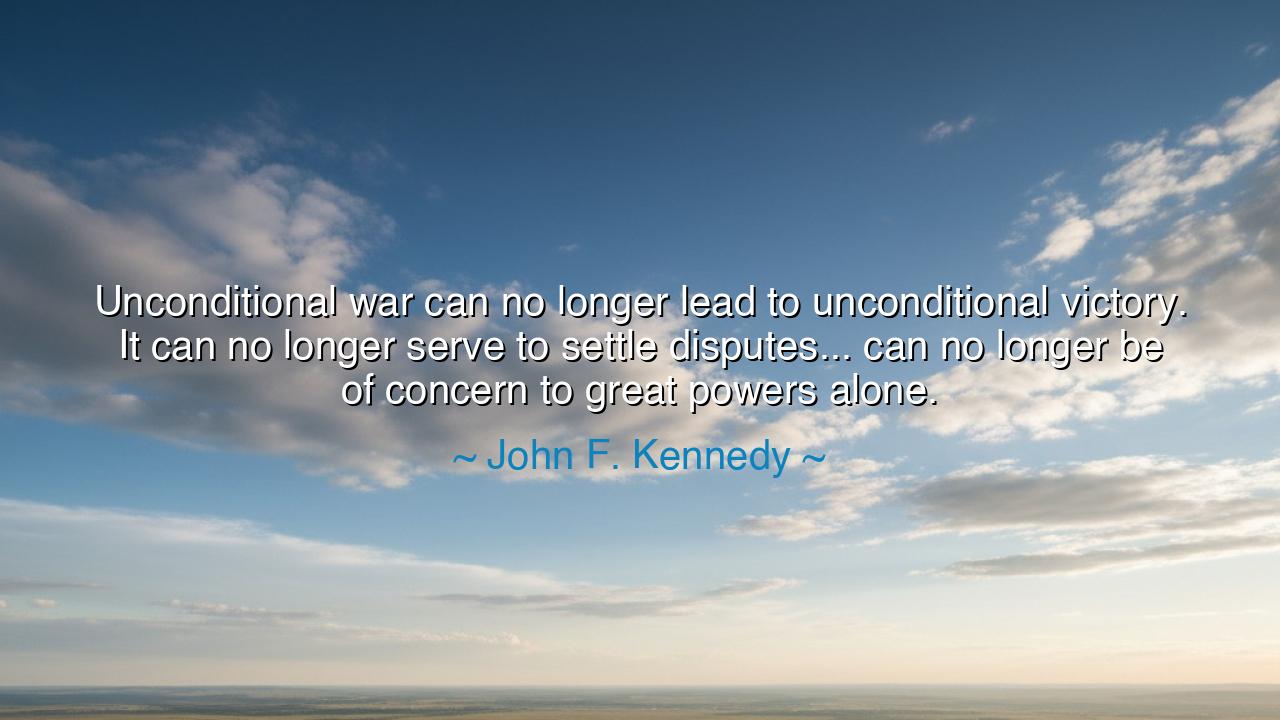
Unconditional war can no longer lead to unconditional victory. It
Unconditional war can no longer lead to unconditional victory. It can no longer serve to settle disputes... can no longer be of concern to great powers alone.






In the solemn and prophetic words of John F. Kennedy, the warrior of peace and guardian of a perilous age, we hear a truth forged in the fire of the twentieth century: “Unconditional war can no longer lead to unconditional victory. It can no longer serve to settle disputes... can no longer be of concern to great powers alone.” These words, spoken in an hour when the world trembled beneath the shadow of nuclear fire, stand as both warning and wisdom. They remind humanity that in the age of terrible weapons and global interdependence, war has ceased to be the sword of resolution—it has become the instrument of annihilation. Kennedy, speaking not as a conqueror but as a custodian of civilization, declared that mankind must either master conflict or be destroyed by it.
The origin of this quote reaches to the heart of the Cold War, when the great powers, armed with nuclear arsenals capable of ending all life, stood locked in a silent standoff. In 1963, in his American University Commencement Address, Kennedy sought to speak not to his nation alone, but to the conscience of humanity. He had seen the terror of near-extinction during the Cuban Missile Crisis, when a single misjudgment could have plunged the earth into darkness. In that moment of awakening, Kennedy realized that victory in such a war would be no victory at all. What good is triumph when the ashes of the world are your prize? What ruler, he asked in spirit, can claim dominion over a graveyard?
When Kennedy declared that “unconditional war can no longer lead to unconditional victory,” he was overturning the old creed of conquest—the belief that total destruction of the enemy could bring peace. In earlier centuries, kings and empires waged war to secure glory, land, or pride. Their triumphs were measured in the submission of others. But in the age of nuclear arms, war had lost its moral and practical meaning. To unleash total war was to unleash total ruin. Kennedy saw that the new age demanded not the warrior’s pride, but the peacemaker’s courage. In his vision, victory was no longer found in domination, but in survival, in the shared preservation of the human race.
He further warned that war was no longer the private matter of great powers alone. Once, empires could wage conflict in distant lands while their homelands slept in peace. But technology had dissolved all boundaries. The bombs that fell from the sky would not distinguish between soldier and child, between conqueror and conquered. Every nation, no matter how small, was now bound into the same fate. War had become universal, its reach unlimited, its consequences shared by all. Thus, Kennedy proclaimed a new truth for a new world: that peace must be the concern not of a few, but of all humanity. Every citizen, every leader, every nation had become a steward of survival.
Consider, as a mirror of his warning, the Hiroshima and Nagasaki bombings of 1945. In those cities, tens of thousands perished in a single instant. The sky itself seemed to fall upon the earth. The victors of that war did not rejoice, for even in triumph they glimpsed horror. Those mushroom clouds became the dawn of a new reality—the revelation that man’s power had outstripped his wisdom. Kennedy’s words, spoken two decades later, were the voice of that realization given form. He saw that the age of the warrior had ended; now must begin the age of the wise.
In the ancient world, war was seen as the test of greatness. The Greeks sang of Achilles, the Romans of Caesar, the Chinese of their warring dynasties. But in this new epoch, Kennedy sought to redefine greatness—not in the courage to fight, but in the courage to refrain. To seek peace in a time of tension, to extend the hand of negotiation across the abyss, required a valor rarer than that of the battlefield. The true hero of the modern world, Kennedy taught, is not the one who conquers nations, but the one who conquers the instinct to destroy.
The lesson, then, is clear and timeless: as humanity’s power grows, so too must its compassion. We must learn that our destinies are bound together—that the suffering of one nation is the shadow upon all. The weapons that divide us cannot be unmade by hate, only by understanding. Kennedy’s call is not just to leaders but to every heart: that we abandon vengeance for dialogue, and pride for partnership. Peace, he said, is not a dream but a process—one that begins in the mind of every individual who chooses empathy over enmity.
So remember this, O sons and daughters of the earth: the age of absolute war is gone, but the age of moral struggle remains. Each of us stands at the frontier between destruction and creation. Let our strength be measured not by how fiercely we can strike, but by how deeply we can forgive. Let nations compete not in weapons, but in wisdom; not in conquest, but in compassion. For as John F. Kennedy taught in that fragile hour, humanity must put an end to war, or war will put an end to humanity. And to live by that truth is to ensure that civilization itself endures beyond the fire, into the dawn of lasting peace.






AAdministratorAdministrator
Welcome, honored guests. Please leave a comment, we will respond soon